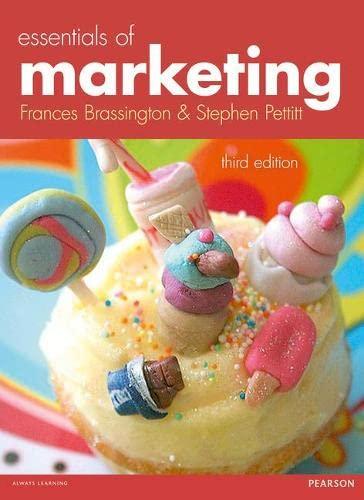What is a book, and what exactly is the core benefit that the reader derives from it?
Question:
What is a book, and what exactly is the core benefit that the reader derives from it? If it’s about engaging with the content, then the emergence of e-reading devices and digital books represents a great development for publishers and readers alike. For the consumer, an e-reader is an immensely convenient way of carrying around a library of hundreds of books that can be accessed whenever and wherever you want – according to Mintel’s (2011) survey, 87 per cent of us like to read in bed and 84 per cent of us read while we’re on holiday. You can acquire new books cheaply and easily from the comfort of your armchair with instant delivery, without the hassle of having to visit an actual bookshop or waiting for a parcel to be delivered, and of course, once you have an e-book, physical storage space is not an issue. You can annotate the text without permanently marking it, and thus edit your annotations, and you can easily share favourite passages with other readers.
The market for e-books really took off in the UK over Christmas 2010, with 7 per cent of British adults claiming to have been given an e-reader, and then to have paid for and downloaded an average of almost 6 books each in January 2011 (Telecompaper Europe, 2011). There are many e-readers on the market, some of which are dedicated to the one function i.e. downloading and reading books, and some of which are multifunctional, such as the Apple iPad. A pioneer of the dedicated e-reader, however, which perhaps has done the most to stimulate growth in this market, is the Kindle, developed and sold by Amazon, the online retailer.
The e-book revolution started in the USA, but is rolling out across the world, not least because of Amazon’s international presence which has given it a ready-made distribution platform and existing customer base in many countries. A Mintel survey undertaken in the UK suggests that 44 per cent of respondents tend to buy most of their books online, buying from sites such as amazon.co.uk. Thus the product launches and marketing activities that Amazon undertakes with the Kindle in the USA follow later in the UK, and then into Germany and beyond.
Amazon is thus only now starting to see the same sort of growth take off in the UK and Europe as it has already enjoyed in the USA.
The extensive promotion of Kindle on Amazon’s own UK website following its launch into the UK market in 2010 had clearly had an effect in stimulating this growth. It is advertised prominently on the Amazon homepage, and has its own ‘department’ for every 100 hardbacks. In the USA, the ratio is over 200 e-books sold for every 100 ‘real’ books (hardback and paperback combined). One interesting feature of this market that is perhaps part of the reason for this revolution in book-buying habits is that unlike many new electronic devices that appeal largely to younger, tech-savvy customers, the e-readers are finding favour with older consumers as well, and with aficionados of certain literary genres. One publisher suggested that there is a particular niche among ‘. . . crime or romance readers. They tend to read a lot of books and the cost is a decisive factor: you can get these books cheaper as e-books. If you love crime and you read so much that you can’t keep it all, you probably give a lot of books away to charity’ (as quoted by Groskop, 2011).
Whoever is doing the buying, e-readers are certainly changing purchasing patterns within the publishing industry. Traditionally, book sales peaked in the run-up to Christmas as people bought books as gift. Now, publishers are seeing a further surge in sales in January and February as people who received e-readers as gifts load them up with reading matter.
Questions
1. If a publisher was to ask you, ‘What business are we in?’, how might you respond?
2. Why do you think the Kindle has been so successful?
Discuss this with reference to its marketing mix.
3. Printed books have been around for centuries.
It could be argued that they have served their purpose very well and that readers are perfectly satisfied with printed books as a means of knowledge transfer and as a source of personal emotional fulfilment. To what extent, therefore, can you argue that the development of the e-reader and the e-book is a marketing rather than a product oriented business philosophy?
4. Is the traditional, independent bookshop dead?
Step by Step Answer:

Essentials Of Marketing
ISBN: 9780273727644
3rd Edition
Authors: Frances Brassington, Dr. Pettitt, Stephen





